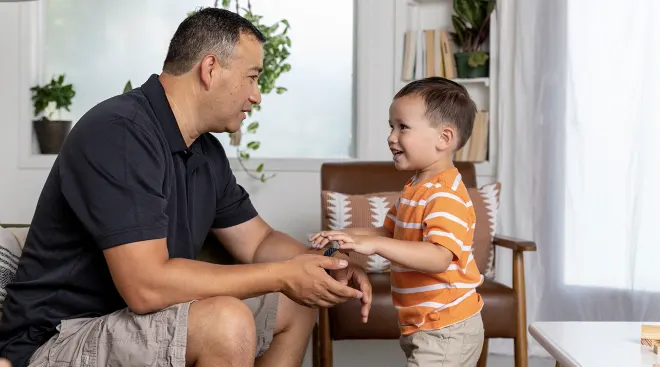Signs of Speech or Developmental Delay in a Toddler?
We all want our kids to develop on track — and if they’re not, we want to get them help as soon as possible. But identifying a delay can be tricky, especially for first-time parents.
It’s a good idea to become familiar with several important developmental milestones. Most kids, for instance, walk around one year of age and most kids talk around age two. Keep in mind, though, that there is a wide range of normal when it comes to developmental milestones. Some kids walk independently as early as nine months. Others don’t take their first steps until 16 months. Both extremes are within the range of normal.
It’s also important to remember that normal development is about progress. In other words, babies start out making simple breathy vowel sounds. Over time, they add on more sounds. Later, they attach certain sounds and combinations of sounds to certain objects, and eventually they begin talking. Even then, there’s a steady progression: most kids start with single word utterances before progressing to multiple-word sentences and sentences become paragraphs. If, at any time, you think your child’s development is beginning to regress, or go backwards, contact your doctor. It’s not entirely uncommon for a baby to seemingly “forget” a certain skill, such as rolling over, for a short period of time, but it’s not normal for a child who was babbling to suddenly stop communicating all together.
Your child’s healthcare provider can help you track your child’s development and spot any developmental delays. In fact, that’s the primary purpose of your toddler’s well-child checkups. So stick to the checkup schedule and expect your pediatrician to ask questions about your child’s social interaction, physical skills and cognitive development. Be prepared to share information about your child’s usual activities, and feel free to ask questions. If you have a nagging sense that something isn’t right, tell your doctor — parents are often the first to spot a problem. So if your heart tells you something is wrong, it’s smart to get a professional opinion — you’re _not _being paranoid.
Please note: The Bump and the materials and information it contains are not intended to, and do not constitute, medical or other health advice or diagnosis and should not be used as such. You should always consult with a qualified physician or health professional about your specific circumstances.
Plus, more from The Bump:
Navigate forward to interact with the calendar and select a date. Press the question mark key to get the keyboard shortcuts for changing dates.




















































